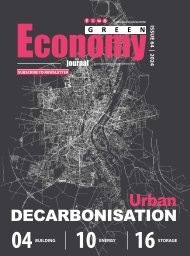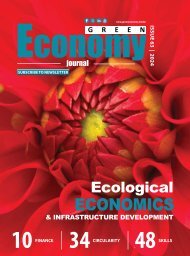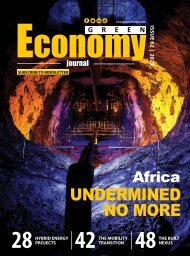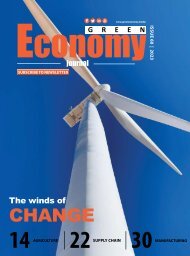Green Economy Journal Issue 58
You also want an ePaper? Increase the reach of your titles
YUMPU automatically turns print PDFs into web optimized ePapers that Google loves.
ENERGY<br />
IT’S TIME TO LOOK IN THE MIRROR<br />
and ask ourselves if we really care about our planet<br />
Let’s take a moment and reflect on the energy crisis in this country. We are hovering around stage 6<br />
loadshedding at the time of writing this, and there are fears that it will get worse during winter.<br />
BY REVOV*<br />
Simply put, we don’t have enough energy to power our faltering<br />
economy. That’s the one side of the coin. On the other side,<br />
we find ourselves in a world that is under increasing pressure<br />
to reduce carbon emissions. Make no mistake, our country will<br />
pay the price in terms of international trade unless we step up<br />
and honour our renewable energy obligations.<br />
However, there is a third side to this coin – the rim. And the rim<br />
of this coin is not defined by either the pressure of supply or the<br />
pressure to avoid losing out on international trade. It is defined by<br />
the ethical responsibility of doing the right thing. We must start<br />
caring about the planet.<br />
Around the world, and especially in this country, people are quick<br />
to dismiss the “green agenda”. Let’s take a moment to reflect on how<br />
this plays out in South Africa.<br />
On a national level, we are being told that we don’t have the luxury<br />
to worry about renewables because there is an urgent energy crisis to<br />
fix. The solution, we are told, lies in ships burning gas off our coastline,<br />
and a re-investment in our notoriously unreliable and dirty coal power<br />
stations.<br />
On a personal level, we hear that we don’t have the luxury to worry<br />
about the lowest carbon footprint energy backup solutions because<br />
we must keep the lights on as cost-effectively as possible. This<br />
inevitably leads to people using generators or battery systems made<br />
from inferior chemistry, or from the right chemistry but without much<br />
thought going into the carbon footprint of the battery.<br />
Worrying about whether we will have a planet in a generation’s<br />
time is certainly not a luxury. It is the absolute crux of the point.<br />
This is the radical mindshift that’s required. It is time more South<br />
Africans stood up for the environment. If anyone needs to be<br />
reminded just how dire the situation is, do yourself a favour and visit<br />
the Human Impact Lab’s Climate clock. We have eight years left until<br />
the dominoes fall one by one.<br />
It is the absolute crux of the point.<br />
We must start caring<br />
about the planet.<br />
Remember the chimney collapse at Kusile? To rush the unit back<br />
into operation by the end of this year, a host of environmental standards<br />
(such as removing dangerous chemicals from the byproduct) have<br />
been waived – all in the name of reducing loadshedding. Fair<br />
enough, but does the prospect of acid rain on innocent people in<br />
Mozambique not keep you awake at night? It should.<br />
A common refrain in South Africa is that renewables cannot<br />
produce the amount of power we need. Renewables really can<br />
generate power – and large amounts to boot. Not only will it go a<br />
long way towards solving the energy crisis, but it will be clean and<br />
more reliable.<br />
In one year, Vietnam’s ambitious and forward-looking rooftop<br />
solar programme added 9.3GW of electricity to the country’s<br />
energy supply. Today, because they did not invest fast enough in<br />
transmission infrastructure at the same time, they must put a lid<br />
on the sheer amount of power being generated. Don’t let anyone<br />
tell you renewables can’t produce enough electricity: regulations<br />
and an outdated mindset is what stops renewables from generating<br />
enough electricity.<br />
We simply must do the right thing. Renewable energy, backed up<br />
with 2nd LiFe battery technology – with as close to a zero-carbon<br />
footprint as possible, and which fills a crucial spot in the circular<br />
economy as it solves what to do with replaced electric vehicles’<br />
batteries instead of dumping them in landfills – ensures we have<br />
an almost endless supply of energy storage capacity waiting to be<br />
put to use.<br />
It just takes bravery.<br />
* Written by Lance Dickerson, MD at REVOV.<br />
35

















